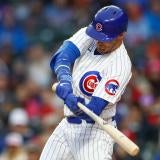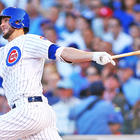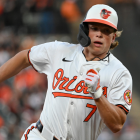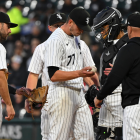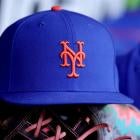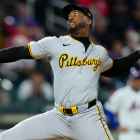One hundred and sixty-two games have been played. Ten playoff teams are in the dance. Time to put a bow on the 2016 MLB regular season with our picks for player awards.
Since I have a Manager of the Year ballot this season and am not allowed to reveal who I voted for until the results are made public, we'll stick to the three other major awards: Cy Young, MVP and Rookie of the Year.
NL Cy Young
The most fascinating of all the award races, because of both on- and off-field factors.
Off the field, the Jose Fernandez story takes center stage. His unbelievable escape from Cuba, his dominance of the MLB batters from day one, and his untimely death at age 24, and his earned place among the National League's elite (he posted the fifth-highest strikeout rate by any qualified starting pitcher ever this year) combine to make him a worthy candidate both on merit and sentiment.
Still, I'm backing Max Scherzer. TheNationals ace has thrown some 40 innings more than Fernandez and fellow Cy Young front-runner Noah Syndergaard, and 81 more than out-of-this-world Dodgers soul-crusher Clayton Kershaw, who would've easily been my pick if he hadn't missed so much time with an injured back. Scherzer trails only Fernandez and Kershaw in strikeout rate, leads the NL with a strikeout-to-walk rate of better than five-to-one and ranks near the top in run prevention.
All of the above, as well as Giants co-aces Madison Bumgarner and Johnny Cueto and the Cubs' dominant trio of Jake Arrieta, Jon Lester and NL ERA leader Kyle Hendricks deserve consideration. But Scherzer's combination of excellence and huge workload make him the pick, by a hair.
AL Cy Young
Maybe even tougher to call than the free-for-all NL Cy race. For the traditionalists' set, you have 22-game winner Rick Porcello. For the group of voters who have a tough time differentiating between multiple strong starting pitcher candidates, you have Zach Britton, who posted the lowest single-season ERA for any full-time closer ever (0.54), while going a perfect 47 for 47 in save chances.
You could make a case for another half-dozen candidates, easy. Aaron Sanchez finished first in ERA among qualified AL starters while rookie Michael Fulmer just missed qualifying after being pulled early due to a rain delay in his final start. Fulmer's ERA would have been good for third in the AL.
Adjust for park factors and Porcello holds the slim edge. Chris Sale ranks second in innings pitched and K/BB rate. Justin Verlander has been the league's whiffiest pitcher. Masahiro Tanaka, Jose Quintana and J.A. Happ don't lead in any major statistical category, but all three own impressive and diversified résumés that make them defensible picks for the award.
My winner, Corey Kluber, owns an impressive combination of statistical markers. By raw run prevention and strikeout rate, he's just a couple of bloop hits shy of the league leaders. He's an innings machine who has been healthy all year. Strip out the effects of a vastly improved team defense anchored by outrageously talented shortstop Francisco Lindor, and Kluber's the best in the league. Like the NL battle, you could pick a whole bunch of other candidates and get no strong rebuttal. Kluber just gets the nod here, again by the slimmest of margins.
NL MVP
It's a two-man race, with Dodgers wunderkind Corey Seager making a strong case. Here's the argument for Seager: Durable, elite hitter (sixth-best in the National League by park-adjusted offense), plus baserunner, plays a premium defensive position and does it very well.
Yet even though Seager excels at every facet of the game, the pick here is for Bryant, because he has been as good or better in nearly facet of the game. Seager gave the Dodgers nearly 700 plate appearances of stardom this year ... but Bryant rang up a few more. As great as Seager's bat was ... Bryant's was just a little better, even after adjusting for the offensive gap between Wrigley Field and Dodger Stadium. Seager helped his team on the basepaths ... but Bryant was, by advanced metrics, the third-most valuable baserunner in the entire league, despite swiping a relatively modest eight bases. And while Seager's solid defense at short is a major asset, Bryant displaying above-average glovework at third while also playing plus D in left and right field makes him the kind of invaluably versatile player the Cubs crave.
Consider that Bryant is just 24, Seager just 22 and other elite NL talents are similarly young (Bryce Harper is 23, Nolan Arenado's 25, Freddie Freeman and Anthony Rizzo are 27) and the NL MVP battle between this generation's young stars could be a thriller for years to come.
AL MVP
The argument I made a month ago remains the same today: Trout has been the best player in the league for each of the past five years (this year included), and trying to dance your way to other candidates because it's boring to keep backing the same guy makes no sense. By park-adjusted offense, Trout has been the best hitter in the league. He ranks second in the AL in baserunning value, and continues to excel defensively in center, by both advanced metrics and highlight reels.
Yes, Mookie Betts, Josh Donaldson, Manny Machado, David Ortiz, Francisco Lindor, Adrian Beltre and Jose Altuve all put up excellent numbers on teams that are either in the playoffs or competed down to the wire. And the Baseball Writers Association of America intentionally chooses not to clarify what's meant by the word "valuable," meaning voters can pick whoever they like in good conscience based on any definition they like. I just look at it like this: Players getting rewarded based on how good or bad a job their team's general manager did in building a roster is a silly premise, especially in a sport that's more one-on-one-matchup-focused than just about any other team sport.
Trout has been the best player in the American League this year by a considerable margin. He is therefore the most valuable player in the American League.
NL Rookie of the Year
...in one of the biggest runaways in the history of the award.
We tip our caps to Dodgers rotation saver Kenta Maeda; Jon Gray becoming the first homegrown Rockies pitcher to light up the league since Ubaldo Jimenez; and Trea Turner, the 7,000-tool center fielder who could make the trade that landed he and Joe Ross for Steven Souza Jr. end up being one of the most lopsided deals of the decade. But Seager has a case for NL MVP, let alone Rookie of the Year. It's not unreasonable for Dodgers fans to close their eyes and wonder if they might be watching the start of a Derek Jeter-like career in L.A.
AL Rookie of the Year
Consistent excellence, or two months of a supernova?
Gary Sanchez makes the case for the latter. He set all kinds of records for off-the-charts power to start his career, drawing comparisons to the likes of Joe DiMaggio in the process. With 20 homers in 53 games and a batting line of .299/.376/.657, Sanchez performed like an MVP for one-third of the season.
As incredible as Sanchez has been, I'm still taking Fulmer's season-long performance over that one-third of a season. Fulmer didn't just play a supporting role in the Tigers' unlikely success this season. He nearly finished third in the AL in ERA (falling just short of the minimum innings to qualify), providing a vital stabilizing force at the top of the rotation to make up for Jordan Zimmermann's injuries, and struggles by other Tigers starters not named Justin Verlander. After taking a few outings to get acclimated to the league, Fulmer reeled off 15 starts out of 21 in which he fired six innings or more, including 10 straight starts in which he allowed two runs or fewer. Even after an inconsistent run in September, that's a remarkable run for a rookie in the era of hyper-cautious workload monitoring.
If Sanchez keeps mashing at this level, he'll dwarf whatever Fulmer accomplishes in the future. But the Rookie of the Year award recognizes best performance during that rookie season, rather than serving as a proxy for a player's future upside. And Fulmer just did a little bit more to help his team this year.




















